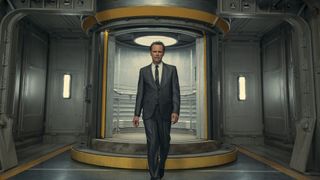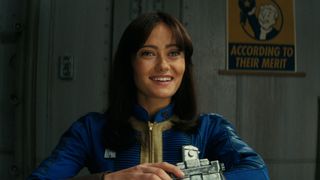Amazon’s Prime Video has managed a real Nuka Cola Victory here

Amazon’s Prime Video has somehow introduced yet another outcome I had not previously thought possible. The new Fallout show honestly somehow feels like an adaptation of a game that doesn’t exist yet.
The modern Fallout games often follow a fairly classic RPG formula. There are, of course, deviations and specifics and variations, but typically the following tends to take place: the main protagonist and their worldview is introduced, said worldview is subsequently shattered in some way that sends them off to resolve a single issue, and the resolution of that issue is complicated in such a way that the original reason they even started off in the first place is either irrelevant, unimportant, or obsolete.
Press start

(Image credit: Prime Video)
This sort of narrative structure is by no means exclusive to the Fallout games, but the framework easily fits Fallout 3 and Fallout 4 with only a small change for New Vegas in that the protagonist introduction bit is reversed with the second step. And the new Fallout show actually follows the exact same pattern too.
In the Prime Video series, Lucy (Ella Purnell) is your average Vault denizen looking to live and procreate until her home is attacked and her father (Kyle MacLachlan) is kidnapped, so she sets off into the post-apocalyptic ruins of Los Angeles only to end up trying to deliver something somewhere else but that turns out to be A Whole Thing and then… well, you should watch the show, but trust me: things get complicated.
It helps that everything supporting or surrounding the main narrative of the show is seemingly painstakingly detailed. When Todd Howard previously said that the folks making the show were “sweating every pixel,” he absolutely was not kidding. From the items like RadAway bags to the weapons to the Power Armor to the Vault-Tec advertisements to the over-the-top gore, the show pulls directly from its source material in a way that feels supportive but never completely reverential. Those bits are there to help express the story the show is telling rather than being strictly fan service.
Through all eight episodes of Fallout, I simply could not shake the feeling that I was watching an adaptation of a game. It felt like if maybe I squinted a bit, I could make out the dialogue options being navigated in real time, complete with failed and successful Speech checks, with corresponding responses that felt true to the worldbuilding presented by the games. It’s in conversation with everything that came before in a way that I’ve never really seen from a video game adaptation before.
Transmedia never changes

It does feel like this is maybe the ideal point of TV adaptations of games. Watching the show has made me hungry for more Fallout, and because there’s no truly new game to experience there, I’ve actually gone back to New Vegas for the first time in a decade and even the mobile game Fallout Shelter. (I’d play Fallout 4 again, and likely recommend the same to anyone interested in the franchise, but I personally left absolutely no meat on that bone and remember it vividly.) Some executive somewhere would probably love to hear this and say something about synergy.
I suspect that neither New Vegas nor Shelter will scratch the itch that the show has given me. They will only help bide time until there’s more show for me to watch, and I surely hope there will be soon. It’s not a perfect show by any means, but then the games aren’t perfect either. But in terms of how well Prime Video’s Fallout nails the vibe of the games, it’s difficult to imagine it coming any closer. Famously, war never changes, but Fallout the franchise certainly does. If this show is an example of the future of Fallout – the folks that made it have said it’s basically Fallout 5 – I say bring it on and I can’t wait.



